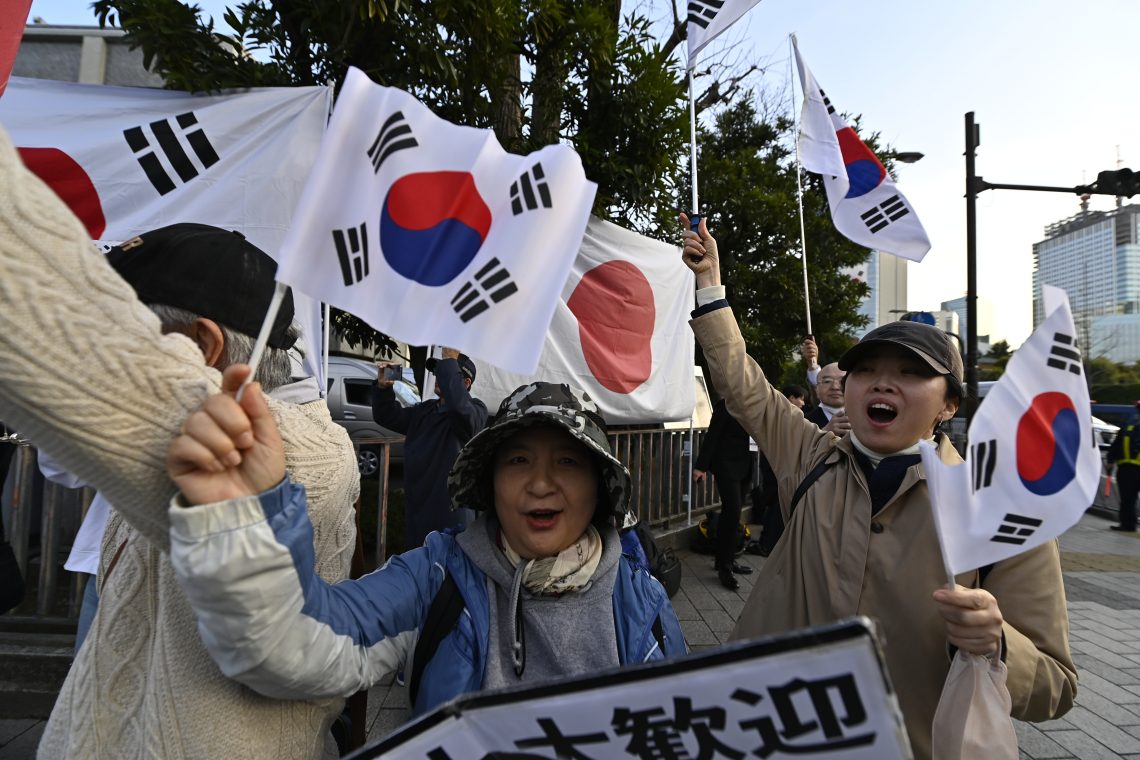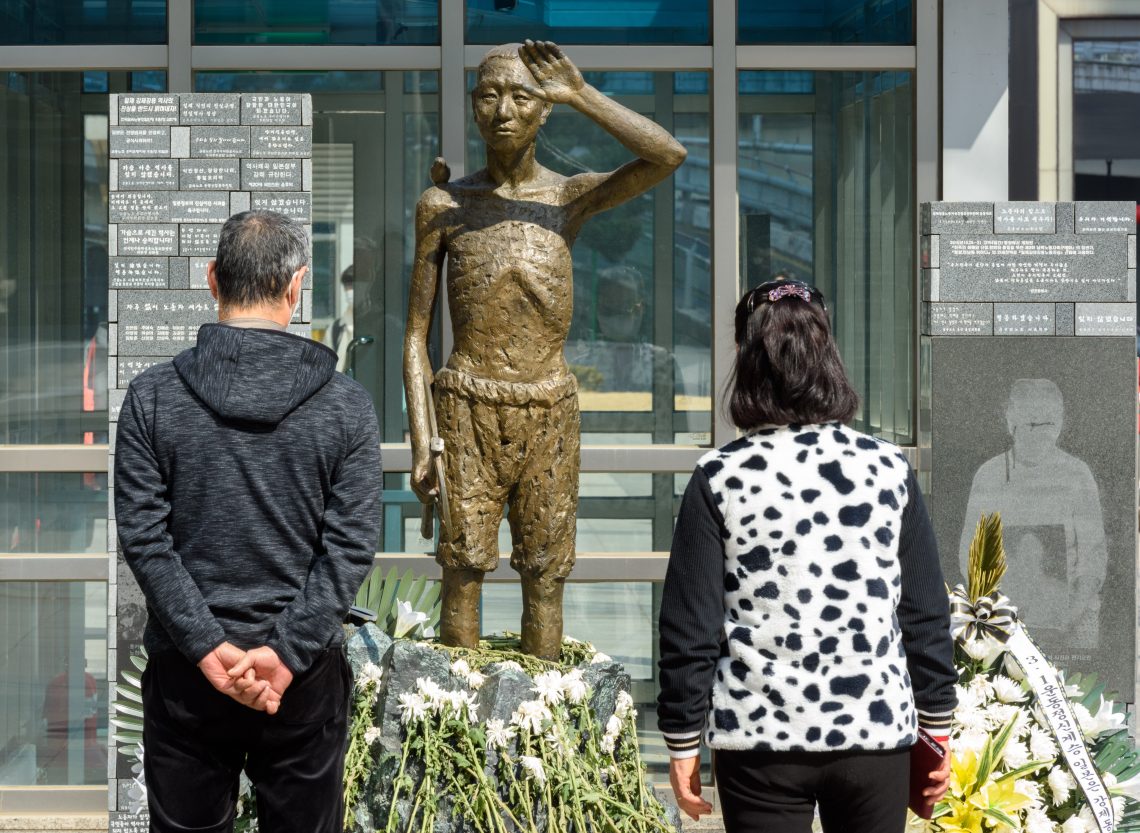Fear of China brings Japan and South Korea closer together
Seoul and Tokyo are under intense outside pressure to reconcile their historical differences and help forge a unified Far East security front to stand up to China and North Korea.

In a nutshell
- The war in Eastern Europe changes the security situation in the Far East
- Japan and South Korea are to lead the emerging coalition against China
- To serve that role, Tokyo and Seoul must improve their relations
Both geographically and culturally, the Far East is removed from Russia’s war of attrition in Eastern Europe. The crises afflicting East Asia may have the potential of escalating into full-bore wars, but they have little in common with the events in Europe. Nevertheless, Beijing, Taipei, Manila, Seoul and Tokyo are drawing critical lessons from Russia’s aggression on Ukraine – and changing the security landscape in the Far East as a result.
Old-fashioned war returns
Like the Europeans, the East Asians have had to wake up to the reality that, once again, the world is afflicted by traditional warfare, with national armies involved and soldiers engaged in World War I-style trench combat. Furthermore, authoritarians such as President Vladimir Putin in Russia, President Alexander Lukashenko in Belarus, President Xi Jinping in China and supreme leader Kim Jong-un in North Korea, effectively undermine global stability. Reluctantly, the West, which had grown complacent during the short period of globalization after the end of the Cold War, has had to react to this new threat – as many argue, from a position of weakness.
The Asian allies and friends of the United States have had to accept the need for a considerably more robust defense than they deemed necessary when the world seemed to firmly embrace the “Washington Consensus” of liberal democracy, market economy, free trade and the rule of law.
President Biden’s declaration of full military support to Taiwan has assuaged some fears.
The tremendous shock arrived during the administration of U.S. President Donald Trump (2017-2021) when South Korea and Japan, America’s most critical Asian allies, learned that U.S. military support was not an unconditional guarantee. In Japan’s case, doubts emerged about the feasibility of a full-scale U.S. military response should China attack the Senkaku Islands in the East China Sea. (Both Japan and China claim these islands, currently under Tokyo’s control.) Since President Joe Biden moved to the Oval Office in January 2021, the U.S. foreign and security policy has eschewed Mr. Trump’s transactional approach and returned to a more traditional, predictable posture. President Biden’s declaration of full military support to Taiwan has assuaged some fears. However, once the Pandora’s box of distrust in the U.S. defense commitments opened, suspicions in the Far East lingered.
The legacy of Shinzo Abe
China’s growth to a would-be hegemon of continental Asia leaves the local safeguarding of peace and stability in the Far East primarily to the geopolitical postures of Japan and South Korea.
The late Japanese Prime Minister Shinzo Abe (2006-2007 and 2012-2020) had made it a central point of his security policy to reduce the overdependence of Japan on the U.S. umbrella. He did this by ramping up the country’s defense capacities, sparking a national debate over Article 9 of the Japanese constitution, sometimes called the “no war” clause, and the country’s pacifist approach to security.
Read more about Japan’s approach to security
Realism overtakes wishful thinking in Japan
Most notably, Prime Minister Abe increased the international profile of Japan. The single emphasis on the alliance with the U.S. gave way to a more diverse national security approach. Its most significant result was the intensification of bilateral and multilateral relations with India. Mr. Abe was the driving force behind the Quadrilateral Security Dialogue (the Quad), comprising the U.S., Japan, India and Australia.
South Korea firms its defenses
In the case of South Korea, we witnessed a change in security policies after the country’s presidency went from the liberal Moon Jae-in to the conservative Yoon Suk-yeol in May 2022. Seoul is now steering a more resolute course in dealing with North Korea, enhancing its military cooperation with the U.S. and striving to build a more self-reliant defense industry.
With the increased reach of the North Korean ballistic missiles (they may soon be able to carry their warheads to the American mainland), Seoul must take into account the North’s enhanced nuclear blackmail vis-a-vis the U.S. and the implications that such blackmail may have for South Korea’s heavy reliance on the U.S. for national defense.
In this game of strategies, South Korea and Japan are forced to reflect on their bilateral ties. It may surprise many that although Seoul and Tokyo each have a vital defense alliance with Washington, their relations are not where they should be. Until recently, they were marred by mutual resentment and suspicion. Like Sino-Japanese relations, recent history also weighs heavily on the exchanges between Japan and South Korea.
Massive human rights violations occurred, with Koreans being recruited as forced labor and Korean women forced into prostitution.
With China’s rise as the new world power, geopolitical interests in the Far East have been changing. While Europe has a comprehensive security architecture in NATO, Asia has not created a regional multilateral security framework.
In 1910, the Japanese Empire, its military prowess enhanced by the victory in the Russo-Japanese War in 1905, annexed the Korean Peninsula as a Japanese colony. Earlier, in 1894-1895, Japan occupied the island of Taiwan as a colony. While its rule over Taiwan was perceived as positive by many locals, the occupation of Korea caused extreme enmity among the local population. Japan pursued a policy of deliberately eradicating Korean culture: historical monuments were destroyed, and there was a suppressive campaign against the Korean language. Also, massive human rights violations occurred, with Koreans being recruited as forced labor and Korean women forced into prostitution.

However, Korean demands for reparations and an apology for the war crimes committed by the Japanese occupiers have been falling on deaf ears in Tokyo. The new South Korean president won the office in part because of the promise to pursue a tougher line in Korean-Japanese negotiations. There can be no doubt that in both countries, substantial segments of the electorates oppose revisions of the official history and reject a reconciliation along the lines of the new beginning in Franco-German relations after World War II. But as time passes and the horrific abuses of the Japanese colonial regime fade in living memory, the two democratic neighbors might finally move closer. Bilateral tourism, particularly younger generations visiting, may help mutual understanding.
New geopolitical profile of the G7
In early May 2023, Korean President Yoon visited Japan at the invitation of Prime Minister Fumio Kishida. That was the first bilateral summit in the Japanese capital in nearly 12 years. The time gap alone indicates a rocky relationship with frequent irritants. The media described the event as a breakthrough and a new chapter between the two countries, but only time will tell if this is the case. The two sides are under intense pressure to intensify their economic, political and cultural relations.
Japan is the chair of the Group of Seven (G7) for the current year. Prime Minister Kishida announced that he had invited President Yoon as a special guest to the G7 summit in Hiroshima. As Russia and China are coming together, the G7, originally a forum focused on economic issues, has acquired considerable geopolitical clout. Earlier on, Prime Minister Kishida had already extended an invitation to India’s Prime Minister Narendra Modi.
Read more on the Asian powers
Japan and South Korea: Strategic alignments
Obviously, in years to come, the platform of the seven biggest economies will have to deal primarily with the challenge posed by China to a world order in which the influence of the West is threatened like never before since the Cold War. That is expected to be reflected in the agenda of G7.
While Japan and South Korea are rivals in several industries like shipping, steel and car production, and while in the field of soft power, especially entertainment, South Korea is catching up with Japan, there is enough scope for the two countries to pursue common interests in the global economy. Indeed, Japan would like South Korea to be less pliant toward China. However, in dealing with Beijing, Tokyo and Seoul are bound by divergent interests.
Concerns about North Korea
Every realistic geopolitical scenario for East Asia must deal primarily with the military threat from North Korea. The regime in Pyongyang is the most totalitarian, closed and secretive country in the world. The hotspot with the most imminent threat to peace and stability in the Far East is the border dividing the Korean Peninsula. Even Beijing has little sway in containing the unpredictable North Korean ally.
Economic and political cooperation between South Korea and Japan will grow, in great part due to American pressure.
The Pyongyang regime sees the possession of nuclear arms as life insurance. Kim Jong-un is convinced – probably rightly – that without them, his regime would have gone the way of those of Saddam Hussain in Iraq or Muammar Qaddafi in Libya.
China seems incapable of halting Pyongyang’s nuclear program. Beijing’s problem is that, with growing North Korean nuclear capacities, other Far East countries may deploy them as well – an unwelcome prospect for China. At the beginning of the year, President Yoon mentioned for the first time that with the growing threats from the North, Seoul might opt for nuclear weapons or invite the deployment of an American nuclear deterrent on South Korean soil (which has not been the case since the U.S. withdrew its nuclear weapons from South Korea in 1991).
That stands in contrast with Prime Minister Kishida’s plan to raise the issue of nuclear disarmament at the G7 summit in Hiroshima, where, together with Nagasaki, nuclear weapons were used for the first time in a conflict. Of course, a regional buildup might also motivate Japan to join the nuclear powers. Today, due to its long reliance on atomic energy generation, Japan is the only nonnuclear weapon state in possession of a full nuclear fuel cycle. Beijing, Pyongyang, Seoul and Washington know it would not take Japan long to acquire a potent nuclear deterrent.
Scenarios
The most likely scenario is that, while the burden of history will not be totally lifted for the foreseeable future, economic and political cooperation between South Korea and Japan will grow, in great part due to American pressure. Washington can ill afford to squander security capital while China modernizes its already extensive military forces with determination.
Beijing will most carefully observe what dimensions the cooperation between South Korea and Japan take and try to put a spanner in the works wherever possible. We foresee this also in the economic realm, where South Korea is vulnerable to losing the crucial Chinese market.
Even more likely is the scenario that Beijing will continue to profit from the tensions and threats posed by North Korea, whose goal is to keep the traditional distrust between Koreans and Japanese going.
Japan, obviously, faces stiff challenges too. Prime Minister Kishida has shown himself to be sensitive to Korean concerns. However, many others in the government and the ruling elite adhere to more traditional Japanese approaches. There is also a special concern about Japanese citizens abducted by North Korea – an issue that Tokyo diplomats see as a significant hurdle in dealing with North Korea.
Washington kept Japan out of the loop when President Trump went on his failed 2019 trip to woo “rocket man” Kim Jong-un, and that bitter experience is vividly remembered in Tokyo. One also must not forget that despite emphasizing totalitarian communism in the North Korean system, the historical distrust between Koreans and Chinese remains.
In the final analysis, all bilateral relations in the Far East are ultimately weighed down by sensitivities from the area’s convoluted history.










